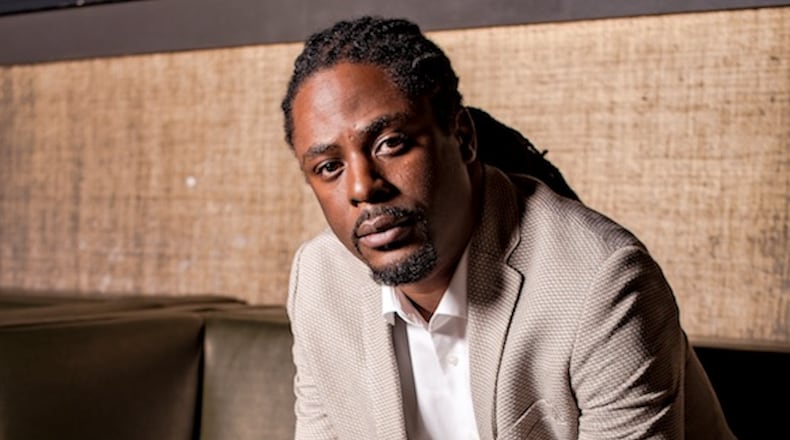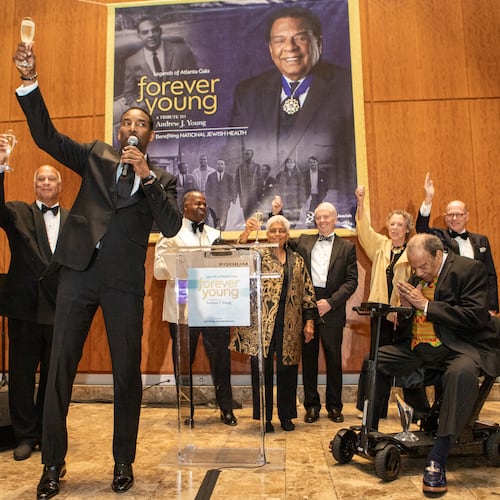Brian “B High” Hightower records all his popular YouTube video interviews in a small room next to a window overlooking downtown Atlanta. It’s a familiar scene to anyone who has seen an episode of his “B High TV” talk show.
What the cameras don’t show is that this unassuming space is just one of four recording studios Hightower owns and operates inside a 21-story Marietta Street office building, in walking distance from Five Points MARTA station, where Hightower Media’s suite is located.
“I was about to put it on Campbellton Road,” admits the native Atlantan, who has published more than 4,000 videos on his YouTube channel, which boasts more than 300,000 subscribers. Combined, the videos have received more than 100 million views.
“Then I got to thinking, that might not be the best place to have celebrities coming through and be in the middle of the damn hood. So let me make sure I had a place that was safe and secure, so that when T.I. comes in he can park his car, come straight up and nobody even knows he’s in the building or that he’s downtown.”
It’s not hypothetical; Clifford “T.I.” Harris was a guest on an episode of B High TV in January.
Hightower, who also employs a small team of three to four people, adds, “That plays a part in how the content comes out when [guests] come into a room… They feel safe and secure so they can open up and they can talk. So I’ve got to look the part.”
Born at Crawford Long Hospital (now Emory Midtown), he spent his early years living near the famous Blue Flame Lounge strip club on Harwell Road. He was raised in the Ben Hill community, and says his parents used their relatives’ addresses in Adamsville and the Cascade neighborhood so he could attend Collier Heights Elementary and Southwest Middle School.
He’s also the grandson of Greater Elizabeth Missionary Baptist Church founder Reverend Dr. James E. Hightower. And after graduating from Mays High School, Hightower earned a mass media arts degree at Clark Atlanta University.
With such a fully stamped Atlanta passport and an ATLien accent straight out of an OutKast album skit, it’s clear why Hightower’s YouTube catalog resembles a classic Atlanta and Southern hip-hop mixtape. He doesn’t just sound the part; he lives it.
Hightower’s video interviews have included many high-profile newsmakers representing hip-hop culture in Atlanta and beyond. There are conversations with underground Atlanta rap royalty like Raheem the Dream, Southern rap statesmen like Bun B of UGK, Memphis legend Playa Fly, perennial ATL ambassador Killer Mike, plus A-list A-Town rappers of today like Lil’ Baby and 21 Savage – notably before they achieved superstardom.
You’ll also find talks with controversial figures like conservative activist Angela Stanton-King, ex-drug kingpin Andre Willis a case defendant in the trial of former Atlanta attorney Fred Tokars, and incarcerated or fallen rappers like YFN Lucci, Trouble and Bankroll Fresh, making the channel something of a time capsule of storytelling.
“I went to school with killers, drug dealers, robbers, pimps and prostitutes, but I also went to school with lawyers, doctors, engineers, pediatricians and regular working folks,” says Hightower when talking about the wide range of people he invites for interviews. “That’s just how I was raised, I talk to everybody the same.”
Hightower’s rise didn’t happen overnight, even though it kind of did. His career started in 2005 with an internship at Atlanta’s Hot 107.9 FM radio station while attending Clark Atlanta. From there he became a board operator, handling broadcast equipment inside the station’s studios and working his way up to his own overnight show, from 2 a.m. to 5 a.m., in 2008.
Later in 2010 he became a producer for Gangsta Grillz Radio, a program hosted by influential hip-hop deejay DJ Drama. It was during this time, between 2010 and 2011, when Gangsta Grillz co-host Trendsetter Sense advised him to start doing interviews to set his show apart.
“At first I was like, ‘I’m [on] overnight. Don’t nobody want to do or hear no interviews overnight,’” says Hightower. Still, he developed a strategy of recording interviews during daytime business hours and playing edited versions during his graveyard shift show, believing that club-hoppers might still be tuning in.
“Atlanta nightlife was still there at the time and people were listening to the radio on the way home, so I figured I’d give it a try.”
Credit: Courtesy of B High TV
Credit: Courtesy of B High TV
Hightower admits being frustrated at times in the past by what felt like a lack of support from his superiors and peers at the radio station, who didn’t understand his vision. But that lack of attention opened up space for him to try new things while no one was looking.
He began spending his own money to hire videographers to record his interviews, uploading them to YouTube and turning the audio into podcasts. This was in 2012, long before such programming strategies were common in the radio space, especially in Atlanta, which made Hightower a pioneer.
He recalls interviewing veteran artists and giving them their flowers long before popular shows of today like rapper Noreaga’s booze-fueled “Drink Champs” talk show made the concept palatable. “I’ve always been a history buff and I was hell bent on telling everybody’s story. And I wasn’t gonna stop until every story got told,” he says.
“[There’s] not a podcast that got some real motion in this city that didn’t come and sit with me at one point or another, and get some damn game,” says Hightower in hindsight.
Being an early adopter had other benefits. Some of Hightower’s earliest guests were then-little-known rappers with names like Future and Rich Homie Quan, who’ve since turned local buzz into international recognition, fame and success.
In 2014, just as Hightower was beginning to build an audience, he was laid off. He remembers feeling sting of the unfortunate timing but luckily was rehired at the radio station just two weeks later, resuming board operator duties before securing an early nighttime slot from 10 p.m. to 2 a.m.
With a second chance, he kicked his mission into overdrive. “I took it upon myself to transfer a lot of these Southern stories that didn’t have a home to the internet,” says Hightower, who parted ways with the radio station and started his own platform in 2020.
The story Hightower says he really loves telling is that contrary to popular belief, Atlanta can be a lucrative media hub.
In 2018, tech entrepreneur Issac Hayes III caused a viral stir with comments suggesting that Atlanta had no equivalent to shows like “TMZ” or “The Breakfast Club,” despite it being considered the nucleus of Black culture and entertainment. This compounded the long-running idea that homegrown talent looking to succeed in media must leave Atlanta for the greener career pastures of New York or Los Angeles.
It’s an idea Hightower says is outdated. He’s been approached about bringing his platform to larger media networks, but says he prefers running his own ship, with no corporate influence. And Hightower cites late Atlanta media pioneer Arnell Starr, whose local video program American Music Makers inspired him to stay in the city.
“We praise affiliation but hate ownership,” says Hightower when asked about those inclinations and the why of B High TV.
“In Atlanta it’s always been the independent platforms that’s really getting the work done and really getting the message out.”
About the Author
Keep Reading
The Latest
Featured





